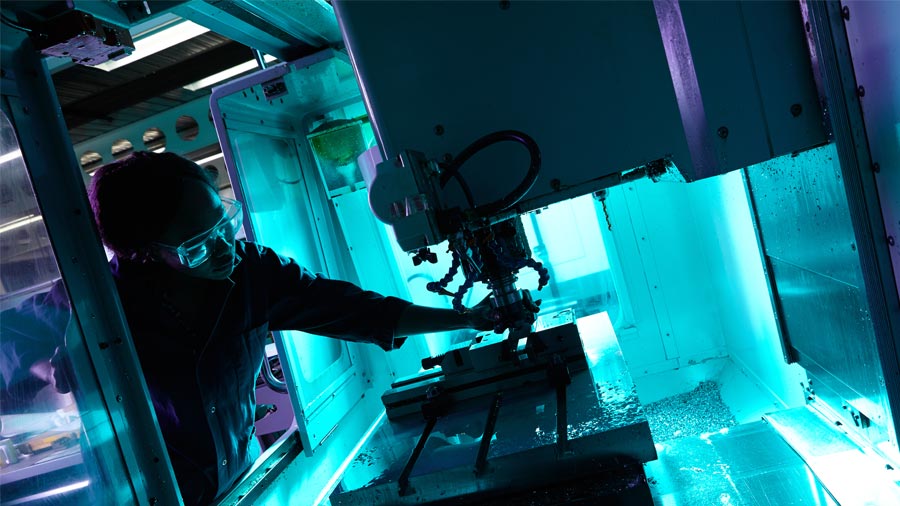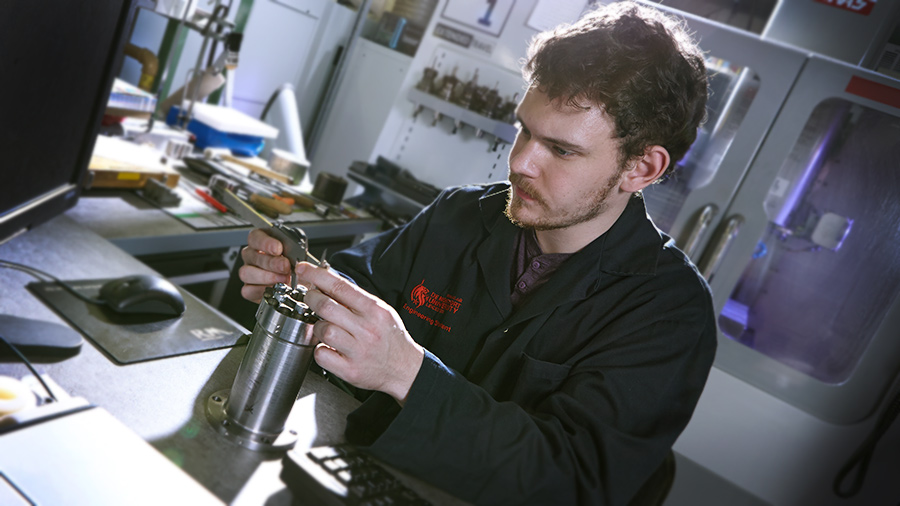Overview
Aeronautical and Aerospace engineering is one of the fastest-growing industries in the UK, with extensive career opportunities in research and development, testing, and maintenance.
This course covers the basic principles of aeronautical engineering, including experimental and theoretical aerodynamics, aircraft design, flight dynamics and control, aircraft propulsion, flight simulation technologies, aircraft structures and computational aerodynamics.
Employment opportunities include careers in aeronautics and aerospace, namely aircraft aerodynamics, wind turbine design and maintenance, aviation management, defense sector, aircraft maintenance, repair and operation services (MRO).
You can study Aeronautical Engineering either as a three-year BEng (Hons) programme, or as a four-year integrated master’s. At the end of year three, you have the option of graduating with a BEng or continuing your studies for a further year for a MEng, subject to meeting the progression requirements.
Key features
- Study a range of topics including aircraft structures and materials, flight dynamics and control, and aircraft propulsion systems.
- Benefit from the academic expertise of researchers who have experience of collaborating with international institutions such as the National Aerospace Laboratories India, Central Aerohydrodynamic Institute Russia and AMST-Systemtechnik GmbH Austria.
- Develop your practical and professional skills in our AIRFOX DISO flight simulator.
- Use our instrumented low speed wind tunnel facility to understand the fundamentals of aerodynamics, test prototype aircraft models and acquire experimental skills relevant to aeronautics and wind tunnel testing.
- Access industry-standard software packages used in aeronautical engineering applications and research, such as MATLAB, ANSYS and OpenFOAM, which will give you the ability to work confidently in an industrial environment.
- Join our student societies to further develop your skills, for example by helping to optimize the aerodynamics of our student racing cars.
- This course is accredited by the Institute of Engineering and Technology, which will help you start your journey towards Chartered Engineer status.
Structure and assessment
Year one
- Engineering Mathematics -1
- Engineering Mathematics -2
- Mechanical Principles – Statics
- Mechanical Principles – Dynamics
- Thermofluids
- Aircraft Design Principles
- CAE and Programming
- Mechanics of Flight
Year two
- Aircraft Structures and Materials
- Fundamentals of Aerodynamics
- Project Management
- Engineering Mathematics – 3
- Introduction to Control Engineering
- Flight Dynamics and Control
- Product Design
- Fluid Mechanics
Placement Year (Optional)
Year three
- Individual Project
- Flight Simulation Technology
- Aircraft Propulsion
- Human Factors and Flight Safety
- Computational Aerodynamics-1
- Structural Dynamics and Aeroelasticity
- Management Concepts in Aviation (optional)
- Navigation and Pilot Studies (optional)
Teaching and assessments
Aeronautical Engineering is taught by knowledgeable and professionally experienced staff giving you the opportunity to gain a sound understanding of the aeronautical engineering fundamentals along with the personal skills that will enable you to study successfully and embark on a rewarding career.
A combination of different forms of teaching is used throughout Aeronautical Engineering, with an emphasis on lectures, supporting tutorials and laboratory classes.
Student-centred learning takes place through research and presentation of findings, report writing, individual and group assignments and practical-work-based exercises for the development of required skills and through understanding of delivered material.
You will be exposed to industry-standard computational methods 3D design, CFD and FEA analysis, Matlab/Simulink, C++ programming software and have access to computer and experimental laboratory facilities throughout the course.
Contact hours
You will be taught through a combination of lectures, tutorials, seminars, group work and self-directed study. Assessment is through coursework (presentations, essays and reports) and usually an exam or test. Your precise timetable will depend on the optional modules you choose to take, however, you will normally attend around 15 hours of timetabled taught sessions (lectures and tutorials) each week, and we expect you to undertake at least 30 further hours of independent study to complete project work and research.
Facilities and features
Aeronautical Engineering Facilities
The University has made significant investment to set up this programme, which will includes dedicated Aeronautical Engineering laboratory spaces and equipment. The facilities will contain two major pieces of equipment:
- A purpose-built subsonic wind tunnel for experimental investigation of aerodynamics considering different simple shapes and aircraft test models
- An industry-standard flight simulator where you can gain piloting skills flying a number of civil and military aircraft models and also validate flight performance, stability and control of your own aircraft designs.
Library
The main Kimberlin Library is open 24 hours a day, 365 days a year (other than in exceptional circumstances) and offers a huge range of online resources, all of which can be remotely accessed from anywhere you choose.
The library is run by dedicated staff who offer additional support to students, including help with academic writing, research strategies, literature searching and reference management and assistive technology, and mathematical skills for non-maths students. There is also a Just Ask service for help and advice, available via email or telephone.
Opportunities and careers
Placements
Work placements are offered as part of this course and they are one of the best ways to boost your skills and experience while studying, as well as improving your chances of gaining a graduate level job and can often lead to an offer of employment for when you graduate.
We have numerous links with organisations both in the UK and internationally, and the placements team will help you find a placement to suit you, your interests and aspirations.
Engineering students have taken part in work experience placements at a number of local, national and international companies including BMW AG, Airbus UK and Siemens.
After successfully completing this programme graduates are expected to find employment in industries such as; Aeronautical and Aero Space, Automotive (vehicle aerodynamics), renewable energy sector (wind turbine design), aviation management, military and defence industries.
The UK aerospace and aeronautical industry is the largest in Europe and the second-largest in the world (second to the US). The sector has seen consistent growth in recent years and supports a growing number of high-skilled, high-value jobs.
#DMUglobal
This is our innovative international experience programme which aims to enrich your studies and expand your cultural horizons — helping you to become a global graduate, equipped to meet the needs of employers across the world.
Engineering students who recently visited New York received a guided tour of some of America’s finest and most complex military hardware.
Graduate careers
After successfully completing this programme graduates are expected to find employment in aeronautical and aerospace industries, civil aviation management, defence sector, aircraft maintenance repair and overhaul (MRO) services, etc.
According to a House of Commons briefing paper the UK aerospace industry is the biggest in Europe and the second biggest in the world with a turnover of £31 billion in 2016. It employs 95,000 people, with the greatest number of jobs in the South West and the East Midlands. The programme team believes the industry will continue to grow in the coming years and this exciting new course will allow us to train the next generation of aerospace professionals.
Zobacz więcej na stronie uniwersytetu >>
Wiza studencka do Wielkiej Brytanii
Aby studiować w Wielkiej Brytanii potrzebujesz wizy studenckiej. Aby złożyć wniosek o taką wizę studencką musisz zdjać certyfikat językowy na poziomie B2.
Uważaj! Do celów wizowych musisz wybrać wyłącznie egzamin w wesji Secure English Language Test (SELT) UKVI .
Co to jest test SELT UK VI registration? Przeczytaj więcej o testach SELT UKVI >>






















